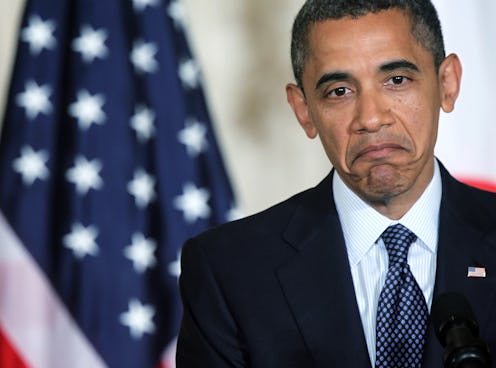News
Yeah, The President Will Veto Keystone XL
With Senate Majority Leader Mitch McConnell already preparing a bill to approve the controversial Keystone XL oil pipeline, it seemed like the White House's hand was going to be forced one way or the other. And today, the President's liberal base and climate activists alike got the answer they were hoping for: President Obama will veto the Keystone XL bill if and when the Republican-controlled Congress passes it, according to White House Press Secretary Josh Earnest. Don't expect this to deter McConnell from passing the bill, however — it's the first one slated for Congress this year, and forcing a President to affirmatively say "no" to passed legislation is one of the big perks of the job.
The decision isn't entirely a surprise on President Obama's part. Given his demonstrated reticence to approve the large-scale pipeline plan — it would snake a major oil vein through the midwest, crossing from Alberta, Canada into Montana, South Dakota, and ending in Nebraska — McConnell likely knew he'd draw a veto threat over this.
The GOP has been championing the project for years, citing it as both a job-creating project and (obviously) a boon to oil production. Its opponents have broadly been a coalition of the environmentalist left, warning of it's potential environmental impact, both in increased carbon emissions and the risk of pipeline-related accidents. And with so many high-profile, low-accountability oil leaks, spills and ruptures in recent years, it's easy to see why this resonates with people.
There are issues of sovereignty tied up in the Keystone Xl proposal, as well. Back in November, the Rosebud Sioux Tribe of South Dakota blasted the project, joining several other native tribes who've come out against it. The tribe's President Cyril Scott went so far as to label the Senate's behavior an "act of war." The pipeline is slated to run through the Rosebud Sioux's territory, and they've made it clear they're not having it — Scott complained the tribe hadn't been consulted, a fact he considered a violation of the treaty that established their reservation.
As the Washington Post details, things are also being slowed up by a legal challenge in Nebraska. Multiple landowners in the state have sued over the proposal, claiming that the decision whether or not to build the pipeline should lie with the state's Public Utilities Commission, not Republican Governor Dave Heineman. Heineman was given authority over the process by the Nebraska legislature in 2012, and in 2013, he approved the plans for its construction.
Speaking to the White House press pool, Earnest said that President Obama's view of the bill hadn't much changed since similar legislation was pushed to the forefront by former Democratic Senator Mary Landrieu at the tail-end of last Congress.
The fact is, this piece of legislation is not altogether different than legislation that was introduced in the last Congress. And you'll recall that we put out a statement of administration position indicating that the President would've vetoed had that bill passed the previous Congress, and I can confirm for you if this bill passes this Congress, the President wouldn't sign it either.
In other words, the stalemate continues.
Images: Getty Images (2)
